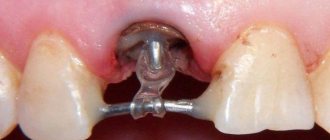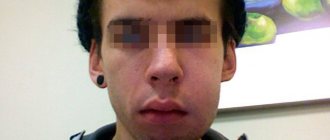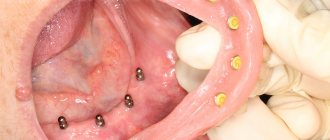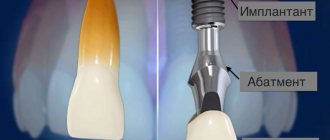Author: Brodsky Sergey Evgenievich Deputy Chief Physician, Candidate of Medical Sciences in the specialties: dentistry and medical microbiology During the implantation of implants, local anesthesia is usually used, after which there may be no sensitivity in the lower lip and chin for several hours. This kind of insensitivity is normal. However, if after 5-6 hours paresthesia persists, then it is likely that the implantologist who performed the dental procedures touched one of the branches of the trigeminal nerve , which are located in the canals of the lower or upper jaw.
Ask a question!
8
We'll call you back in 1 minute
Possible consequences of the operation
After receiving an implant, many people experience discomfort. Most often, patients are bothered by pain in the jaw, swollen gums, and numbness of the oral mucosa. Normally, these symptoms disappear 4-6 days after surgery. To speed up rehabilitation, you need to:
- refuse baths and saunas, hot baths,
- exclude solid foods from the diet,
- use a toothbrush with soft bristles,
- rinse your mouth with an antiseptic solution.
You should also refrain from smoking and drinking alcoholic beverages.
Complications during implant healing
The most serious complications are possible during the fusion of the implant surface with the jaw bone. Among them are the inflammatory process around the titanium analogue of the tooth root and its rejection.
Peri-implantitis
Inflammation of the tissues surrounding a dental implant is called peri-implantitis. The disease occurs due to infection in the space between the gum and the body of the implant. This is possible if the wall of the paranasal sinus is damaged, the postoperative wound is improperly closed, there is inflammation in the adjacent tooth, or inaccuracy in the manufacture of the crown. But the most common reason is a banal lack of oral hygiene by the patient. Inflammation is accompanied by the formation of swelling, bleeding, and pain. If there is no treatment at the initial stage, the disease becomes chronic. Then the infection “eats away” the jaw bone, and the implant becomes mobile. In this case, it is necessary to remove the artificial tooth and treat the hole. Peri-implantitis is a fairly rare phenomenon, occurring in 1–2% of cases*.
Implant failure
Failure of the jaw bone to accept a titanium rod implanted into it is characterized as rejection. The causes may be infectious processes around the implant (peri-implantitis), surgical trauma, lack of bone tissue, smoking immediately after surgery, exacerbation of chronic diseases, and, extremely rarely, an allergy to titanium. The onset of the rejection process can be identified by signs such as implant mobility and pain in the surgical area. In such cases, the artificial root is removed from the hole and a complex of vitamins is prescribed to strengthen the bones. Re-implantation is possible after 1 – 2 months. With a competent doctor’s approach and the patient’s compliance with all instructions, the chance of encountering this unpleasant problem is less than 1%*.
Causes of teeth numbness after implantation
Paresthesia is one of the most common complications of dental implantation. It is characterized by numbness and loss of sensitivity, tingling and burning sensations in the gum area. The cause of the problem is nerve damage:
- during anesthesia,
- preparing a bed for an artificial root,
- screwing in a long implant.
With minor damage, the nerve fibers repair themselves. Rehabilitation can take from 1 to 6 months.
Trigeminal nerve injury
Prolonged numbness of tissues after implantation can also be caused by incorrect selection of the length of implants or their installation without taking into account the anatomical characteristics of the patient. In this case, damage to one of the processes of the trigeminal nerve is possible. Most often, when screwing in dental implants, the inferior alveolar nerve is affected. If it is damaged in the area of the lower lip, cheek and gums (up to the second molars), the following may occur:
- complete numbness of tissues;
- not disappearance, but a violation of sensitivity, without other unpleasant phenomena;
- a change in sensitivity, which is accompanied by an abnormal reaction to certain stimuli and other pathological symptoms.
If the lingual nerve is damaged during implantation, the following may also appear along with numbness:
- uncontrolled tongue biting;
- increased salivation;
- loss of taste;
- swallowing dysfunction;
- difficulties with pronouncing sounds.
If such symptoms appear and prolonged loss of sensitivity after implantation, you should contact the dentist who performed the operation.
When is a doctor needed?
Does tooth numbness persist after implantation? Are you worried about tingling in your mouth? These are some of the main signs of nerve damage, which requires urgent attention to a specialist. You should also consult your doctor if you have the following problems:
- intense pain when chewing and talking,
- decreased sensitivity of lips and tongue,
- difficulty swallowing,
- bleeding gums,
- increased salivation,
- violation of facial expressions,
- feeling of implant mobility.
The dentist will determine the cause of the problems and help eliminate them. If a nerve is damaged, it is necessary to act promptly. If measures are not taken promptly, numbness may persist for several months.
Stages of damage to the mandibular nerve process during implantation
Dentists use a certain classification of injuries to the maxillary branches of the trigeminal nerve. The following stages of paresthesia are distinguished:
- Neuropraxia . Minor damage. At this stage, there is a slight loss of sensitivity and mild numbness, which goes away on its own after approximately 1-2 months.
- Axonotmesis . Despite the fact that the nerve at this stage, as well as at the previous stage, is partially damaged, this damage is more serious. This stage is characterized by the addition of pain. Unpleasant symptoms also go away on their own, but the recovery period is longer and lasts at least two months.
- Neurotmesis . The last stage, characterized by the most serious injury to the nerve process. At this stage, the damaged nerve tissue is replaced with scar tissue, which leads to a complete loss of sensitivity. These changes are irreversible, so restoration of sensitivity cannot be achieved even through surgery.
If jaw numbness continues for more than 5 hours after implant installation, do not delay your visit to the dental clinic. We should not forget that damaged nerve fibers are well restored only at the initial stage, and if you ignore visiting a doctor, the period of healing of the nerve tissue may be delayed, and the patient will require surgical intervention instead of physical therapy sessions to restore it.
How to get rid of numbness?
If a patient who has been feeling numbness in the chin for more than 5 hours after implantation immediately goes to the dental clinic, it will be enough for him to undergo a course of physical therapy supported by drug treatment. Such treatment at an early stage of the pathological process can effectively restore the sensitivity and conductivity of nerve fibers. Before proceeding to restorative physiotherapy procedures, a diagnostic study is carried out, during which the extent and nature of the damage are established. The therapeutic course itself is prescribed by a dentist, neurologist and physiotherapist.
It is worth noting that numbness that occurs after dental implantation may require long-term treatment, since the functional abilities and sensitivity of the facial muscles return gradually. However, timely use of physiotherapeutic techniques makes it possible to achieve a reduction in negative signs in the treatment of various neuropathies from the first sessions. To eliminate parasthesia caused by damage to the trigeminal nerve due to dental procedures, the following series of physiotherapy procedures are effectively used:
- Acupressure. Acupressure in problem areas.
- Acupuncture. Method of acupuncture influence on biologically active points.
- Ultraphonophoresis. Improving blood supply to tissues by exposing them to ultrasonic vibrations.
0%
Installment plan without overpayments
Start treatment today!
Take advantage of interest-free installments for 2 years without a down payment
Find out more
8
Payment by installments is possible without bank participation
In addition to the listed methods of physiotherapy, the patient may be recommended galvanic mud applications and electrophoresis. The speed of recovery, i.e. the return of full sensitivity to the facial muscles, is directly dependent on the patient’s compliance with all the recommendations of the attending physician.
Why is the risk of damage to the trigeminal nerve during implantation minimized at the Partner-Med clinic?
To avoid complications after implantation, for a complex procedure you should only contact trusted clinics that have a name and are popular with patients. In Moscow, one of such dentistry is the Partner-Med clinic. We employ only experienced, highly qualified specialists who can solve any, even the most complex dental problem. When contacting us to install implants, you don’t have to be afraid of any risks, because we:
- When planning an operation to install dental implants, we must calculate the exact model of their installation, taking into account the anatomical features of a particular patient.
- Partner-Med dentistry has a special operating room equipped with modern equipment.
- The operation plan is approved by the orthopedic dentist, chief physician of the clinic, Dmitry Nikolaevich Salatsky.
For patients of other clinics who do not understand why their numbness does not go away after dental implantation, we are also ready to help identify the cause and eliminate it. To get rid of the unpleasant feeling of numbness that reduces your standard of living, just sign up for a consultation at the Partner-Med clinic and get the problem diagnosed.
Just CALL US!
+7
We will answer any of your questions and will definitely help you!
Signs of complications
Implantation is dangerous because complications can arise at very different periods, both immediately after the operation and many years later. According to the nature and period of manifestation, the consequences of dental implantation are divided into three groups: during surgery, in the early period (first months) and in the late period (after a year or more).
During surgery
Medical errors today are exceptional cases, but they still occur if the doctor does not have sufficient experience and professionalism.
During the operation, the following may occur:
- severe tissue injury and wound formation;
- injury to nearby organs.
The reason may be not only an incorrect action by the doctor, but also an error in choosing the size and shape of the implant.
In the early period
After dental implantation, both immediately and during the first months, signs of complications may occur:
- suture separation due to improper application or mechanical trauma;
- severe bleeding that does not stop throughout the day and is caused by damage to blood vessels;
- an increase in temperature of more than 38 °C that persists for more than a day.
Consequences in the early period can be caused by improper installation of implants, infection of internal tissues, rejection of implants by the body, or the development of an inflammatory process.
In the late period
Complications after implantation can occur at any time after prosthetics. This happens under the influence of various factors: from poor hygiene and excessive stress to dental or immune diseases. The consequences can appear after 2, 5 and even 10 years.
After a long period of time, complications are possible:
- peri-implantitis, characterized by inflammation of the tissue around the implant;
- implant rejection or loss;
- exposure of the implant due to improper installation of the gum former.
Our clinic cooperates with Nobel Biocare, which provides a lifetime guarantee on implants. Many years of successful practice, millions of clinical cases around the world allow the company to be on the list of the best. We give each of our patients a corresponding certificate.
How to prevent complications from developing
First of all, you need to carefully and responsibly approach the choice of an implant surgeon. Be sure to pay attention to the specialist’s experience and level of qualifications. A good doctor should be proficient in at least several implantation techniques, should be ready to answer any of your questions, and also explain in detail all the upcoming stages of treatment.
During computer modeling, the doctor must pay close attention to the operation area, examine it from all angles and carefully analyze the location of all important internal structures. The specialist is obliged to warn the patient about the non-standard position of the jaw tissue and the possible consequences. If the nerve is located too close to the intended implantation site, the implantologist will take appropriate precautionary measures to avoid injury.
Consult with an experienced specialist about all the nuances of the upcoming treatment











